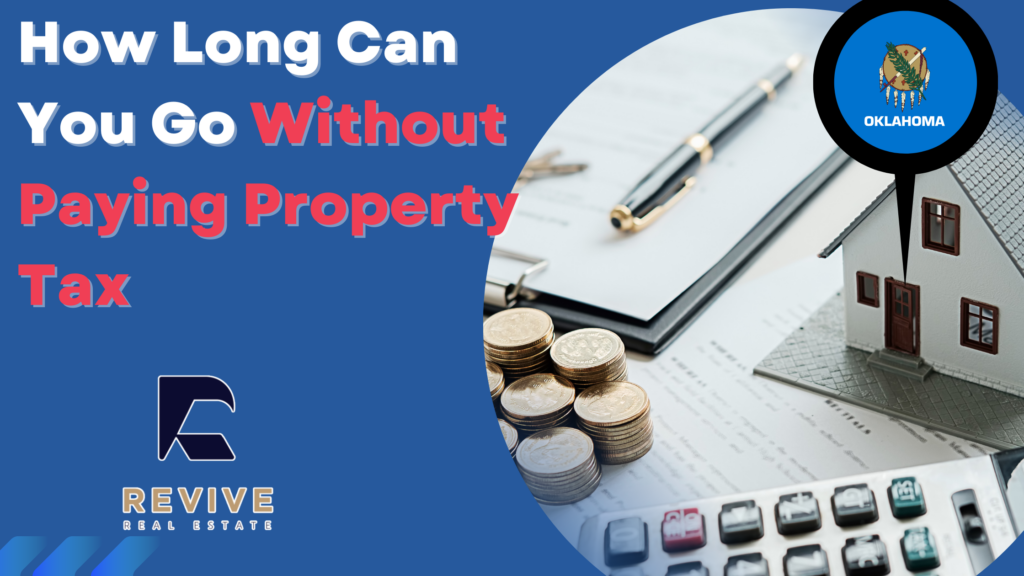
What Is the Process for Paying Property Taxes in Oklahoma?
Paying property taxes in Oklahoma is a straightforward process involving your local county treasurer. Homeowners receive a notice with their tax details, including the property tax payment deadline, usually December 31st each year.
There are several tax payment options:
- Online Payment: Use credit or debit cards via county websites.
- In-Person Payment: Pay directly at the county treasurer’s office.
- Mail Payment: Send payments by mail, ensuring they are postmarked by the deadline.
- Installment Plans: Some counties offer plans to spread out payments.
These options provide flexibility in managing property tax obligations.
How Are Property Taxes Calculated in Oklahoma?
In Oklahoma, property taxes are calculated using a few key elements. The property valuation is done by a county assessor, who determines the assessed value based on market conditions.
This assessed value is multiplied by the millage rate set by local entities and the Oklahoma Tax Commission. This calculation results in the property tax levy. Regular assessments ensure taxes reflect the property’s current worth and funding needs.

When Are Property Taxes Due in Oklahoma?
Oklahoma property taxes are due annually, with deadlines managed by your county treasurer. At least half of the taxes must be paid by December 31st, and the full payment deadline is March 31st of the next year. Meeting these due dates helps you avoid penalties.
What Payment Methods Are Available for Property Taxes?
There are several payment methods for property taxes:
- Online Payment: Pay via the county website with a credit card or electronic check.
- Check or Money Order: Mail these to the county treasurer’s office.
- Credit Card Payment: Accepted online and in-person, with possible fees.
- Installment Plans are available in some areas to spread out the cost.
These methods allow taxpayers to pay most conveniently.
What Happens When Property Taxes Are Not Paid on Time?
In Oklahoma, not paying property taxes on time has consequences. Unpaid taxes become delinquent and incur late fees. Eventually, the county might place a lien on the property, leading to a potential auction to recover the owed taxes. It’s important to pay on time to avoid these outcomes.
What Are the Penalties for Late Payment of Property Taxes?
Delinquent property tax payments in Oklahoma incur penalties, including a 1.5% monthly interest on outstanding balances. This interest continues to accumulate until taxes are completely settled. Supplementary penalties may be imposed if delays continue. Timely payment mitigates the repercussions of late payments.
Is There a Grace Period for Late Property Tax Payments in Oklahoma?
Oklahoma generally does not provide a grace period for overdue property tax payments. Interest begins to accumulate immediately following the penalty date. Individuals experiencing financial difficulties may contact their county treasurer to inquire about potential payment extensions or waivers for late fees. Policies vary by county; therefore, it is advisable to consult local authorities.
How Does Interest Accrue on Unpaid Property Taxes?
In Oklahoma, interest on delinquent property taxes commences immediately after the due date at a rate of 1.5% per month. This interest is compounded monthly on the outstanding balance. Comprehending this process emphasizes the significance of prompt tax payments to prevent escalating expenses.
What Legal Actions Can Be Taken by the County for Delinquent Taxes?
When property owners do not pay their property taxes, counties have several legal methods to collect the owed money. These actions can impact the owner’s rights and ownership status.

What Is a Tax Lien and How Does It Affect Property Owners?
A tax lien happens when a property owner fails to pay taxes. It’s a legal claim against the property, ensuring the county’s interest in unpaid taxes. In Oklahoma, a lien certificate may be issued if taxes remain unpaid. This can prevent selling the property until the debt is cleared. The consequences are serious since liens can lead to foreclosure.
How Does the Tax Sale Process Work in Oklahoma?
In Oklahoma, a tax sale is used to collect delinquent taxes legally. Properties with unpaid taxes are sold at public auction, known as the Oklahoma tax auction process. The county treasurer manages this auction to recover owed taxes while meeting all legal standards.
What Are the Steps Involved in a Tax Foreclosure?
Tax foreclosure is a severe consequence of unpaid taxes in Oklahoma. Here are the steps:
- Notification: The property owner gets notified of the pending foreclosure.
- Legal Action: The county starts legal proceedings led by the county treasurer.
- Auction: The sheriff often manages the auction to settle the tax debt.
Understanding these steps helps property owners avoid losing their property due to unpaid taxes.
How Can Property Owners Avoid Foreclosure Due to Unpaid Taxes?
Foreclosure can be avoided with proactive measures. Property owners should consider these options:
- Payment Plans: Many counties offer plans to help manage delinquent taxes.
- Seeking Legal Advice: Consult with experts for advice tailored to your situation.
- Exploring Assistance Programs: Various programs offer support to prevent foreclosure.
These actions help property owners in Oklahoma protect their assets from tax foreclosure.
What Solutions Are Available to Settle Delinquent Taxes?
There are different ways to address delinquent taxes in Oklahoma:
- Payment Options: Negotiate flexible payment terms with the county treasurer.
- Oklahoma Tax Debt Relief Options: Some programs offer partial relief or extended terms.
- Legal Consultation: Legal professionals can help explore all available options.
These strategies can effectively resolve tax issues for property owners.

Are Payment Plans Offered for Back Taxes in Oklahoma?
Yes, Oklahoma offers payment plans for back taxes. These installment plans help spread payments over time, reducing the financial burden. Contacting the county treasurer early can help secure access to these beneficial plans.
What Should You Do If You Can’t Afford Your Property Taxes?
If unable to pay property taxes, consider these steps:
- Assistance Programs: Look into programs offering financial help for property taxes in Oklahoma.
- Financial Planning: Consult financial planners to handle your financial responsibilities better.
- Tax Relief Programs: Explore relief options applicable to your situation.
- Legal Advice: Seek advice from a legal expert on protecting your property during financial difficulties.
Managing finances proactively and seeking assistance can prevent severe consequences of unpaid property taxes.
It is recommended that you consult a lawyer for personalized advice. Revive Real Estate provides relevant information but recommends professional legal counseling for specific situations.
What Is the Redemption Period After a Tax Sale in Oklahoma?
In Oklahoma, the redemption period allows property owners to reclaim their property following a sale due to unpaid taxes. This period is vital for those who want to keep their ownership and avoid legal problems linked to back taxes. Knowing the details of the Oklahoma property tax redemption process helps property owners handle these issues effectively.
How Long Is the Redemption Period for Property Owners?
In Oklahoma, property owners possess two years from the tax sale date to reclaim their property. During this period, they may remit the outstanding sum and any applicable fees and interest to regain possession. Failure to redeem within this timeframe may result in the permanent loss of property for the owner.
What Does the Redemption Process Entail?
During the redemption process, property owners must follow formal steps to get back their property. This means paying off any back property taxes, interest, and other costs in Oklahoma. State statutes spell out these steps, ensuring property owners know what to do to protect their rights to their land.
Are There Additional Costs During Redemption?
Yes, redeeming a property after a tax sale in Oklahoma includes additional costs. These can be interest on unpaid taxes, administrative fees, and other Oklahoma property tax fees. Property owners should plan for these expenses to avoid surprises and ensure a smooth redemption process.
Can Mortgages Be Affected by Tax Sales?
Mortgages and property liens linked to tax sales can be affected. Mortgage interests may be at risk when a property is sold at a tax sale, which affects both homeowners and lenders. Everyone can protect their best interests by learning about how Oklahoma’s tax foreclosure rules affect mortgages.

What Happens to Mortgage Liens During a Tax Foreclosure?
During a tax foreclosure, mortgage liens might lose priority to the tax lien, which comes first. If the property isn’t redeemed, mortgage companies risk losing their investment. Oklahoma tax lien laws set the hierarchy and rights of these liens, making timely redemption important for mortgage protection.
How Can Homeowners Protect Their Mortgage Interests?
Homeowners can protect their mortgage interests by paying their property taxes on time to avoid default. When foreclosure looks likely, getting legal help and using mortgage defense strategies can help stop it. You need to be vigilant to keep control of your property and mortgage rights.
What Role Does the Mortgage Company Play in Tax Sales?
Mortgage companies have a crucial role in tax sales by protecting their interests. They monitor outstanding tax debts and might pay overdue taxes to maintain their lien rights. Understanding lender responsibilities concerning tax sales helps lenders and Oklahoma homeowners secure their investments.
What Assistance Programs Are Available for Struggling Taxpayers?
There are many programs in Oklahoma that can help people who are having trouble with their money. These services help Oklahomans with their property taxes and other types of taxes. By looking into these choices, residents may be able to find ways to lower their taxes through tax breaks and exemptions.
How Can Property Owners Apply for Tax Relief in Oklahoma?
Those who own property in Oklahoma and want tax help should contact the Oklahoma Tax Commission. To start the process, you must fill out an application and learn about the applicable tax rules. Property owners can lower their tax bills through these programs if they take the right steps to apply.
What Exemptions Might Reduce Property Tax Burden?
Oklahoma offers several property tax exemptions to lessen the financial load on eligible taxpayers. These include:

- Homestead exemption: Lowers property taxes for homeowners.
- Veteran exemption: Provides additional relief for veterans and their spouses.
- Disabled exemption: Aids property owners with disabilities by cutting down on taxes.
- Head of household exemption: Helps single parents or primary caregivers.
These exemptions are key in easing the financial burden for those who qualify.
Who Qualifies for Homestead Exemption in Oklahoma?
The homestead exemption is accessible to Oklahoma homeowners who meet certain criteria. Generally, applicants must own and live in their property as their main home. Additional criteria may include:
- Age: Homeowners aged 65 or older.
- Veteran status: Military veterans may receive extra benefits.
Proof of residency and property ownership is typically required to be eligible.
ges individuals to remain proactive and informed about their property tax duties for effective financial management.
How Are Property Tax Disputes Resolved?
Property tax disputes in Oklahoma can be complex, but understanding the resolution process is key to navigating them successfully. Disputes usually happen when a property owner disagrees with the county assessor’s assessment of the property. Knowing how these disputes are resolved helps homeowners ensure they pay a fair amount.
What Steps Are Involved in Challenging a Property Tax Assessment?
To challenge a property tax assessment in Oklahoma, property owners should follow these steps:
- Review the Assessment: Review your property assessment notice for any mistakes.
- Gather Evidence: Collect documents that support a lower assessment, like recent appraisals or sales data of similar properties.
- File an Appeal: Submit an appeal to the county assessor’s office before the deadline.
- Attend a Hearing: Go to the hearing to present evidence and make your case.
- Receive a Decision: After the hearing, wait for the decision. If you disagree, there might be further legal steps you can take.
What Evidence Is Required for a Successful Appeal?
Successful appeals need strong evidence. Provide:
- Recent property appraisals
- Sales data of similar properties
- Photos showing the property’s condition
- Any other documents that back up your valuation claims
Clear and solid evidence can boost the chances of a successful appeal.
Where Do Property Owners File Their Appeals?
In Oklahoma, property owners need to file their property tax appeal at the county assessor’s office where the property is located. Each county may have different submission requirements, so contact the local office for instructions and deadlines.
What Impact Do Unpaid Property Taxes Have on Credit Scores?
Unpaid property taxes can have serious financial effects, potentially hurting your credit scores. While they are not directly reported to credit bureaus, the consequences can indirectly impact credit health if not addressed.

How Are Delinquent Taxes Reported to Credit Bureaus?
In Oklahoma, delinquent taxes are not directly reported to credit bureaus. However, if left unpaid, they can lead to a tax lien, which can be reported and significantly lower a credit score. It’s important to address tax delinquencies promptly to avoid such outcomes.
How Can Homeowners Mitigate Negative Credit Impacts?
Homeowners can take steps to lessen the negative impacts of unpaid property taxes:
- Pay Off Delinquencies: Focus on settling outstanding tax debts to prevent liens.
- Negotiate Payment Plans: Work with the tax authority to create a manageable payment plan.
- Regular Financial Review: Regularly check your financial situation to ensure timely payments.
Using these strategies can protect homeowners from long-term credit damage.
What Are the Long-Term Financial Implications of Unpaid Taxes?
The long-term financial implications of unpaid property taxes in Oklahoma can be severe. Consequences include accruing interest and penalties, potential foreclosure, and a damaged credit report due to tax liens. Keeping a clear record and addressing delinquencies quickly is vital to safeguarding financial stability. We Buy Houses in all counties and cities in Oklahoma, including Tulsa, Norman, Stillwater, Edmond, Midwest City, El Reno, and Fairfax.
Frequently Asked Questions:
How long can someone in Oklahoma go without paying property taxes before facing penalties?
In Oklahoma, you have until January 1st to pay your property taxes. Missing this deadline can lead to penalties, interest, and a tax lien or foreclosure.
What are the consequences of not paying property taxes in Oklahoma?
Not paying your property taxes can result in a tax lien on your property. You may incur interest charges, and if the situation persists, you could face foreclosure.

Are there any property tax exemptions for seniors in Oklahoma?
Yes, Oklahoma seniors age 65 or over may qualify for property tax exemptions. These exemptions reduce taxes for those meeting specific income and residency criteria.
What steps should be taken if I cannot pay my property taxes in Oklahoma?
If you cannot pay, consider payment plans, applying for exemptions, or consulting legal experts. The county treasurer’s office can help you set up payment schedules.
Can a homeowner reclaim their property after a tax sale in Oklahoma?
Yes, homeowners usually have a redemption period of two to three years. During this time, they can reclaim their property by paying back taxes, interest, and fees.
What assistance programs are available for property tax relief in Oklahoma?
Oklahoma offers several relief programs, such as tax credits and deferments, for low-income homeowners and seniors. Check eligibility and application processes with local government offices.
How does one dispute a property tax assessment in Oklahoma?
To dispute an assessment, file a protest with the county assessor’s office. Gather relevant documents and consider consulting a professional appraiser to strengthen your case.
What should you consider before purchasing a property with overdue taxes in Oklahoma?
Before buying, conduct due diligence to know the outstanding taxes and liens. Legal advice is recommended to understand liabilities. Verify information with the county treasurer.
Sell Your Oklahoma House A Matter Of Days…
No Hidden Fees or Commissions. We Buy Houses in Oklahoma As-Is And Close On The Day Of Your Choice. Fill Out The Form Below.
Additional Resources For Oklahoma Sellers
If you need to Sell your house fast in Oklahoma, we promise to make you a fair, no-obligation, no-hassle offer. Take it or leave it. You’ve got nothing to lose.
Do you still have questions? Calling us could be the best decision you make all week!
Call Us Now at (405) 669-6466


